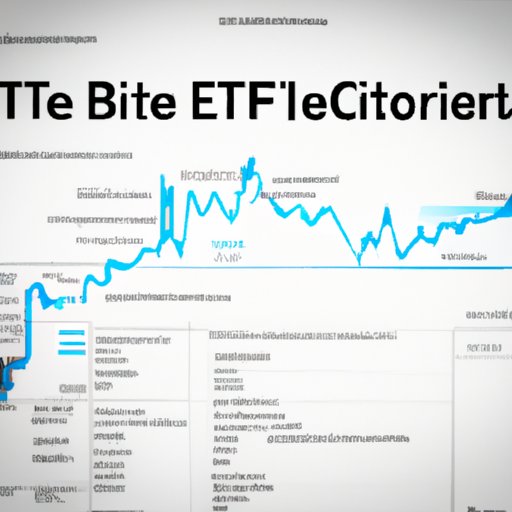Introduction
A Bitcoin Exchange-Traded Fund (ETF) is an investment vehicle that tracks the price of Bitcoin. It allows investors to invest in Bitcoin without having to buy, store or manage it directly. The purpose of this article is to provide an overview of Bitcoin ETFs and explain the benefits and risks associated with investing in them.
Explaining the Basics of a Bitcoin ETF
In order to understand what a Bitcoin ETF is, it is important to have a basic understanding of how ETFs work. An ETF is a type of investment fund that holds a basket of assets such as stocks, bonds, commodities or currencies. ETFs are traded on exchanges, just like stocks, and can be bought and sold throughout the day. They offer investors the ability to diversify their portfolios without having to purchase and manage multiple investments.
A Bitcoin ETF is similar to other ETFs, but instead of tracking the price of stocks, bonds, commodities or currencies, it tracks the price of Bitcoin. Investors can buy shares in a Bitcoin ETF, just like they would buy shares in any other ETF, and their investment will track the price of Bitcoin.

Examining the Pros and Cons of Investing in a Bitcoin ETF
Investing in a Bitcoin ETF has both advantages and disadvantages. Here are some of the pros and cons to consider when deciding whether to invest in a Bitcoin ETF.
Advantages to Investing in a Bitcoin ETF
One of the main advantages of investing in a Bitcoin ETF is that it offers investors exposure to Bitcoin without the need to buy, store or manage the cryptocurrency directly. This can be beneficial for those who don’t want to deal with the technical aspects of buying and managing Bitcoin. Another advantage is that ETFs are regulated by financial authorities, so investors can be sure that their investments are safe.
Additionally, since ETFs are traded on exchanges, investors can buy and sell their shares at any time during the day. This makes it easier to make investments and exit positions quickly if needed. Finally, ETFs offer investors the opportunity to diversify their portfolios without having to purchase and manage multiple investments.
Disadvantages to Investing in a Bitcoin ETF
The main disadvantage of investing in a Bitcoin ETF is that it does not offer direct exposure to Bitcoin. Since the ETF only tracks the price of Bitcoin, investors do not benefit from any changes in the underlying technology or use cases of Bitcoin. Additionally, ETFs are subject to fees, which can reduce returns for investors.
Finally, since ETFs are traded on exchanges, investors may be exposed to market volatility. This means that the price of the ETF may fluctuate significantly in a short period of time, which could lead to losses if the investor is not careful.
A Comparison of Bitcoin ETFs Across Different Exchanges
There are currently several Bitcoin ETFs available across different exchanges. Each ETF has its own rules and regulations, so it is important to research and compare ETFs before making an investment decision. Here is an overview of the most popular Bitcoin ETFs available.
Overview of Available Bitcoin ETFs
The first Bitcoin ETF was launched in 2019 and is called the Purpose Bitcoin ETF. It is listed on the Toronto Stock Exchange and is managed by Purpose Investments. Other Bitcoin ETFs include the Evolve Bitcoin ETF, which is listed on the NEO Exchange, and the CI Galaxy Bitcoin ETF, which is listed on the TSX Venture Exchange.
Differences Between Exchanges
When comparing Bitcoin ETFs across different exchanges, it is important to consider the fees associated with each one. Some exchanges may charge higher fees than others, so it is important to compare fees before making a decision. Additionally, some exchanges may offer additional features such as custodial services, which can be beneficial for investors.

An Overview of Regulatory Considerations for Investing in a Bitcoin ETF
It is important to be aware of the regulatory considerations for investing in a Bitcoin ETF. Depending on where the ETF is listed, there may be different regulations that apply to the fund. Additionally, investors should be aware of the tax implications of investing in a Bitcoin ETF, as well as the legal considerations.
Impact of Regulations on Bitcoin ETFs
Regulations play an important role in the success of Bitcoin ETFs. Depending on the jurisdiction in which the ETF is listed, different regulations may apply. For example, in the United States, the Securities and Exchange Commission (SEC) has yet to approve a Bitcoin ETF, so investors should be aware of the potential impact of regulations on their investments.
Legal Implications of Investing in a Bitcoin ETF
In addition to regulations, investors should also be aware of the legal implications of investing in a Bitcoin ETF. These can vary depending on the jurisdiction in which the ETF is listed. For example, in the United States, the SEC has yet to approve a Bitcoin ETF, so investors should be aware of the potential legal risks associated with investing in one.

Analyzing the Potential Impact of a Bitcoin ETF on Crypto Markets
The launch of a Bitcoin ETF could have a significant impact on the crypto markets. Here is an overview of the potential positive and negative impacts of a Bitcoin ETF.
Positive Impacts of a Bitcoin ETF
If a Bitcoin ETF is approved, it could have a number of positive impacts on the crypto markets. For example, it could attract more institutional investors to the market, as they would be able to invest in Bitcoin without having to buy, store or manage it directly. Additionally, the increased liquidity of a Bitcoin ETF could help to stabilize the price of Bitcoin, leading to more stable returns for investors.
Negative Impacts of a Bitcoin ETF
On the other hand, a Bitcoin ETF could also have some negative impacts on the crypto markets. For example, it could lead to increased speculation in the market, which could cause the price of Bitcoin to become volatile. Additionally, the introduction of a Bitcoin ETF could lead to increased centralization of the market, as large institutional investors could gain more control over the market.

Investigating the Challenges of Creating a Bitcoin ETF
Creating a Bitcoin ETF is a complex process and there are a number of challenges that must be overcome. Here is an overview of some of the key technical and regulatory hurdles that must be addressed.
Technical Issues
One of the main technical issues that must be addressed when creating a Bitcoin ETF is security. In order to ensure that the ETF is secure, it must be built using robust security protocols. Additionally, the ETF must be designed in such a way that it accurately tracks the price of Bitcoin.
Regulatory Hurdles
Another major challenge that must be overcome when creating a Bitcoin ETF is the regulatory environment. In order for the ETF to be approved, it must meet all applicable regulations in the jurisdiction in which it is listed. This can be a difficult process, as regulations can vary significantly from one jurisdiction to another.
Examining the Impact of Recent SEC Decisions on Bitcoin ETFs
The U.S. Securities and Exchange Commission (SEC) has rejected several applications for Bitcoin ETFs in recent years. Here is an overview of the reasons behind the rejections and their impact on the future prospects of Bitcoin ETFs.
Reasons Behind Rejections
The SEC has rejected multiple applications for Bitcoin ETFs due to concerns about market manipulation and investor protection. The SEC has stated that it believes that the cryptocurrency markets are too vulnerable to manipulation and that investors do not have adequate protection against fraud or theft.
Impact on Future Prospects
The SEC’s rejections of Bitcoin ETF applications have had a negative impact on the future prospects of the ETFs. However, the SEC has indicated that it is open to approving a Bitcoin ETF in the future, provided that the applicant can address its concerns about market manipulation and investor protection.
Conclusion
A Bitcoin ETF is an investment vehicle that tracks the price of Bitcoin. It offers investors the ability to invest in Bitcoin without having to buy, store or manage it directly. However, there are both advantages and disadvantages to investing in a Bitcoin ETF, so it is important to do your research before making an investment decision. Additionally, it is important to be aware of the regulatory considerations and legal implications of investing in a Bitcoin ETF. Finally, the SEC’s recent rejections of Bitcoin ETF applications have had a negative impact on the future prospects of the ETFs, but the SEC has indicated that it is open to approving a Bitcoin ETF in the future.
(Note: Is this article not meeting your expectations? Do you have knowledge or insights to share? Unlock new opportunities and expand your reach by joining our authors team. Click Registration to join us and share your expertise with our readers.)
